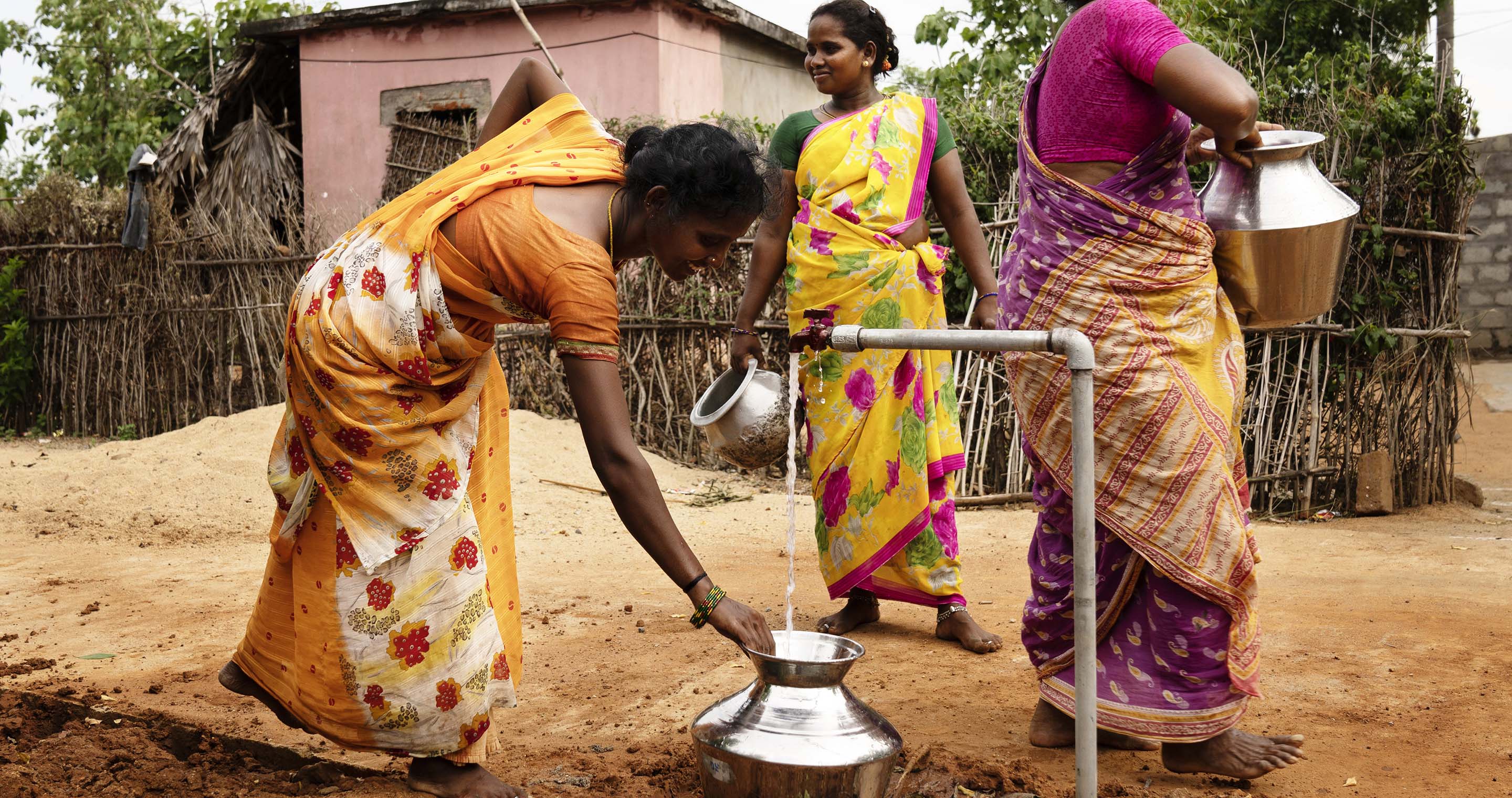

At the heart of the PepsiCo Foundation is our belief in the potential possessed by the people and communities we serve. There are far too many communities around the world, however, that are systemically excluded from access to the essential resources they need to grow, prosper and thrive — like nutritious food, safe water and economic opportunity. That is why the PepsiCo Foundation’s work focuses on the creation of sustainable and innovative solutions to these three critical socioeconomic issues. We know that by alleviating the stress and strain of these barriers, we come one step closer to creating a more equitable world for all.
We are honored to be able to step up to the plate and be a beacon of hope to the millions of people and communities around the world. For more information on how we're positively impacting the planet and the communities where we live and work while progressing towards our pep+ goals, download our 2023 Global Impact Report.
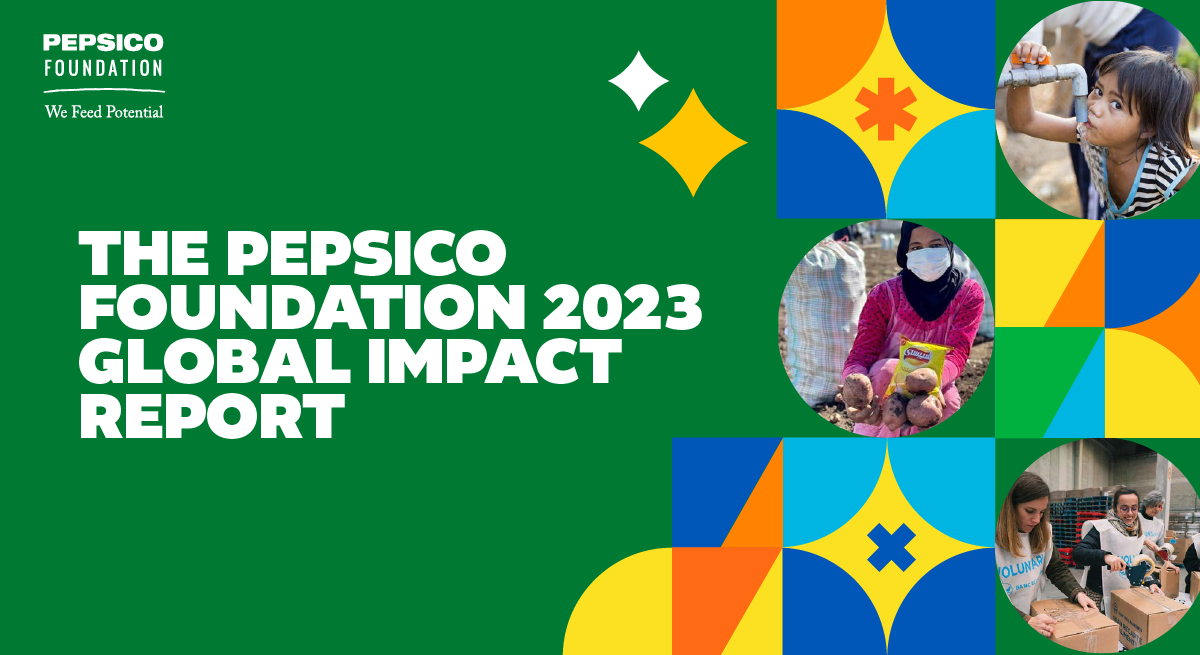
Download the full report
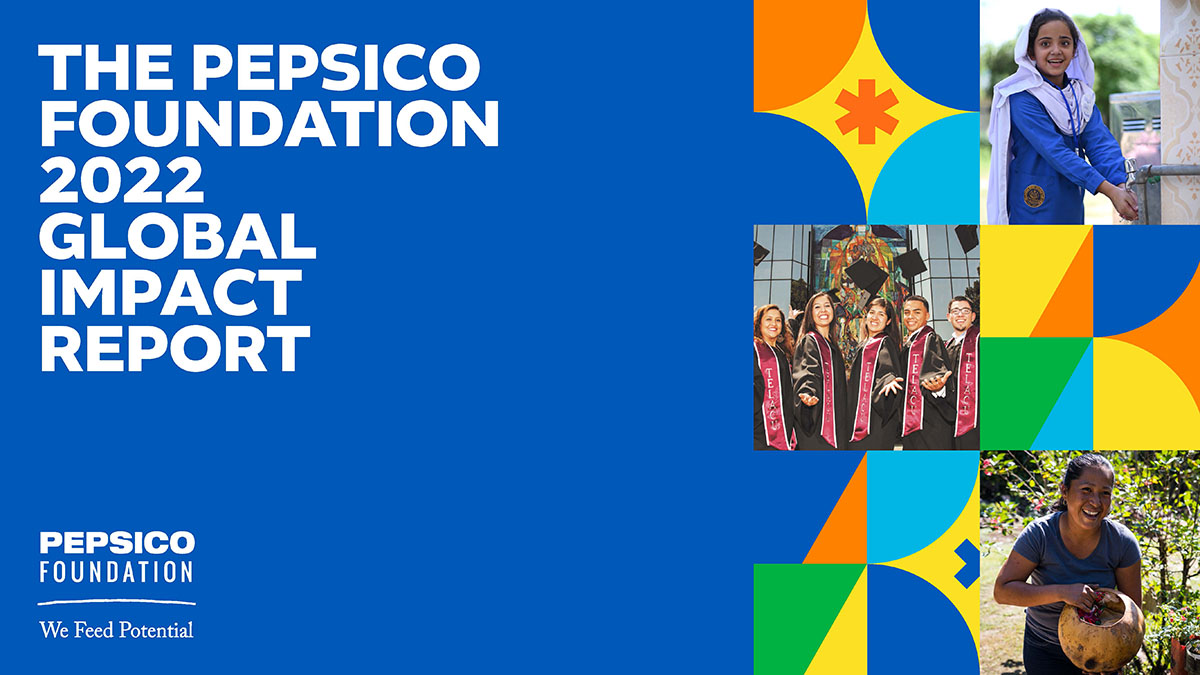
Download the full report
We’ve been investing in tangible social impact since 1962.
Collaborating with industry peers, local and international organizations, nonprofits, and our employees around the globe, we are on a mission to build a more sustainable food system and equitable world through the power of community. Listening to, learning from and being led by the communities we serve is the only way we can take on the biggest challenges facing our global society.
Though our reach is global, we understand that it takes the collaborative efforts of many to make real change in the local communities where we operate. We realize we can do even more when we join forces with industry peers, local and international organizations, and our employees to make large-scale change.
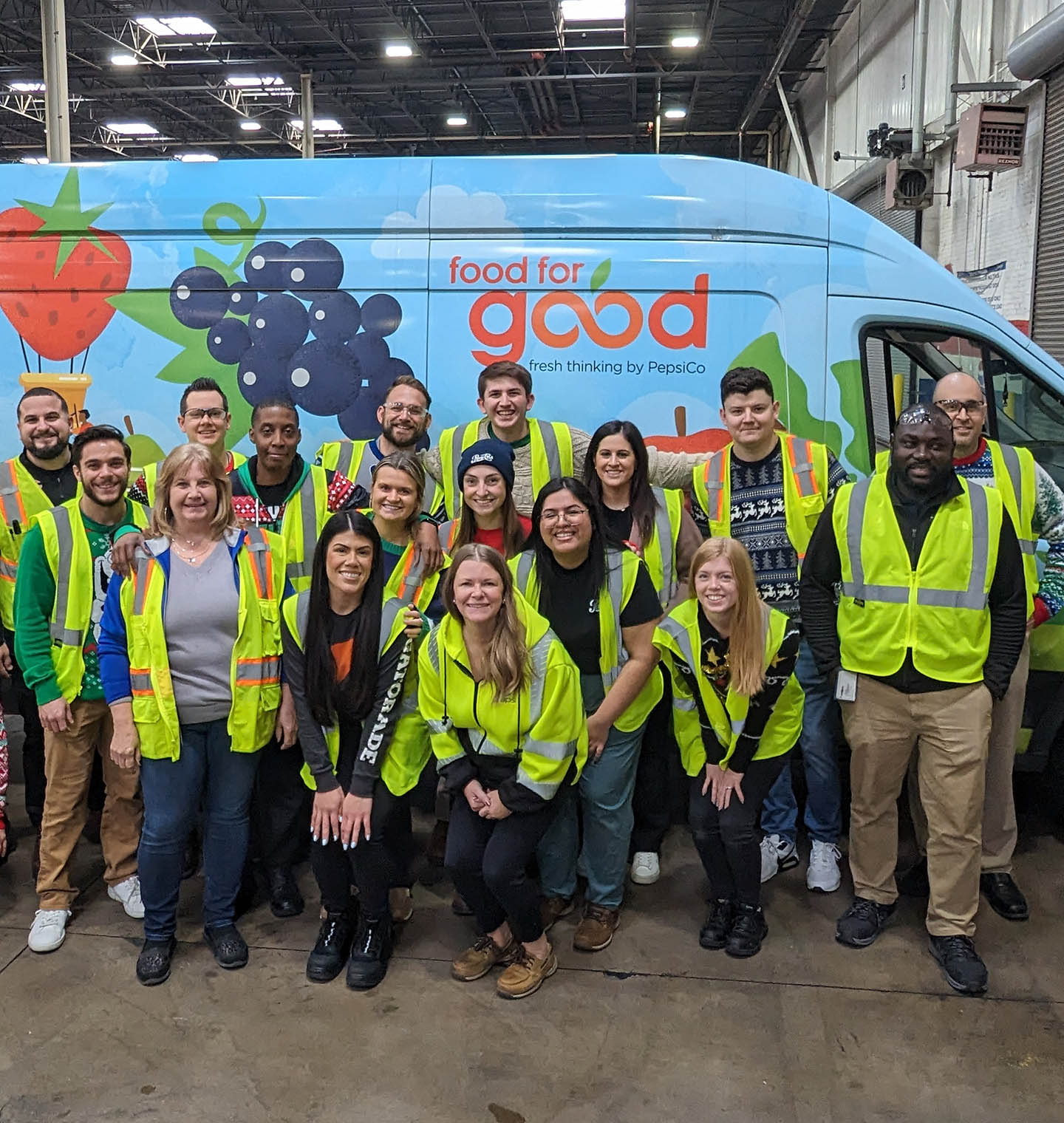
Communities flourish when they’re getting the nutritious food they need. Children are better educated; economies grow; and people live healthier, longer lives.
As of 2022, more than 800 million people around the globe suffer from hunger. That’s 10% of the world’s population. Based on current projections, the United Nations’ sustainable development goal (SDG 2) of zero hunger by 2030 will be missed by nearly 660 million people.
Through Food for Good, PepsiCo’s philanthropic global commitment to advance food security, we’ve reached millions of people over the years, and now we’re taking our commitment to a new level. We’re bringing together the lessons learned from successful programs all over the world and raising our voice — and those of our partners — to fight for food for good. Our first steps:
1. We will invest $100 million through 2030 for the Zero Hunger Pledge in partnership with our sustainability team.
2. We’re aiming to increase nutritious food access for 50 million people by 2030 as part of our PepsiCo Positive (pep+) journey.
We’re combating worldwide hunger by delivering meals, helping food banks strengthen their operations, providing logistical support and technical expertise in the nutrition field, and supporting long-term food security. Since 2009, our Foundation’s programs and partners have distributed more than 245 million meals.
In response to hunger challenges exacerbated by COVID-19, we’re working with more than 60 partners, including Feeding America, the U.S. Department of Agriculture, The Global FoodBanking Network and local nonprofits around the world, to distribute nutritious meals — among other much-needed resources — to people in at-risk populations. Our goal is to deliver 50 million meals by 2030.
Food for Food for Good United States (FFG US): FFG US is a social enterprise that delivers nutritious meals daily for kids in learning environments including school, after-school and summer programs. FFG US does this by hiring from the communities we serve to create economic opportunity and improve workforce readiness. Since 2009, FFG US has delivered more than 50 million meals, partnered with more than 50 local partners and created more than 200 jobs.
China Foundation for Poverty Alleviation (CFPA): Founded in 1989, CFPA is a charitable nongovernmental organization (NGO) registered with the Ministry of Civil Affairs in China. In 2015, we launched Nutrition in Action with CFPA to provide meals and educational classes to underserved students in areas of west China. So far, this collaboration has provided more than 1.6 million meals to more than 13,000 rural students in Zhaotong of Yunnan province and Congjiang of Guizhou province.
United Nations World Food Programme: We have contributed more than $10 million through various programs during a decade-long partnership. Together, we’ve created a multi-country partnership in the Middle East and North Africa, focusing on improving long-term food security needs of communities affected by climate change, conflict, natural disasters and humanitarian crises. In addition, WFP has benefited from a program that engages PepsiCo associates in physical activity to earn grants. To date, support has been provided to school meal programs in the Philippines, Pakistan, Colombia, Haiti, Ethiopia and Kyrgyzstan.
Baylor Collaborative on Hunger and Poverty: One in every six children is currently at risk of hunger in the United States as a result of the pandemic. When schools closed in March 2020 and social distancing measures made it difficult for children to access the nutritious meals they relied upon from their schools, Food for Good US came together with the Baylor Collaborative on Hunger and Poverty, the USDA, and McLane Global to deliver nutritious meals directly to students’ doorsteps. The Meals-to-You program brought together public, private and nonprofit organizations to deliver 39 million meals to more than 270,000 rural students in 43 states and Puerto Rico. Food for Good US delivered more than 18 million meals across the United States in 2020 alone.
Access to safe water is a human right. This precious resource is critical to human dignity, health and economic opportunity.
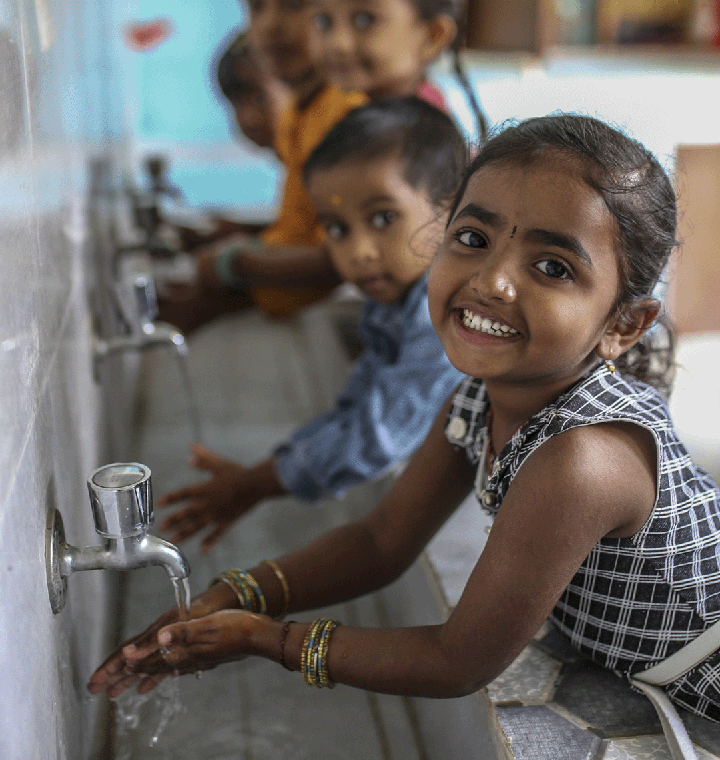
Three billion people don’t have soap and water at home for washing up. Students miss 443 million school days every year because of water-related illnesses. Women and girls spend 200 million hours every day collecting water for their families. And two in five health care facilities globally don’t have places for doctors, nurses and patients to wash their hands. As COVID-19 continues to devastate already vulnerable communities, access to clean water to prevent, slow and treat the disease is more critical than ever.
We focus our support on water distribution, purification and conservation programs. Since 2006, we’ve helped more than 59 million people globally gain access to safe water through our partnerships with leading NGOs and development agencies. During the COVID-19 crisis, our immediate efforts have focused on water distribution, sanitation and hygiene programs to bolster public health. Our ambitious new aim is to reach 100 million people with safe water access by 2030.
WaterAid: Together with this organization, we have increased the availability of clean water at 18 schools in the states of Nelamangala and Palakkad in India. Another program in Maharashtra and West Bengal in India gives farmers and their families access to water where there was little or none before.
Inter-American Development Bank (IDB): With our support, IDB installed water pumps and pipes for rural communities in Latin America, providing water and sanitation services for more than 778,000 people in Peru, Mexico, Colombia and Honduras.
China Women’s Development Foundation: Our funding is helping train 200,000 residents in conservation and environmental protection techniques to address contamination near the Danjiangkou Reservoir. The program aims to ensure a clean, long-term supply of water for 10 million people by 2025 and has reached 800,000 people since 2011.
Safe Water Network: We proudly funded the pilot and expansion of “small water enterprises” in Ghana and India. This work purifies local groundwater to provide affordable and reliable access to safe water, helping more than 1.5 million people since launching in 2008.
Water.org: Our partnership has helped scale WaterCredit, which brings small loans to people across multiple countries, and has provided millions of people with safe water and/or sanitation since 2008. The program also created sustainable and innovative blueprints that helped accelerate access to safe water throughout the developing world.
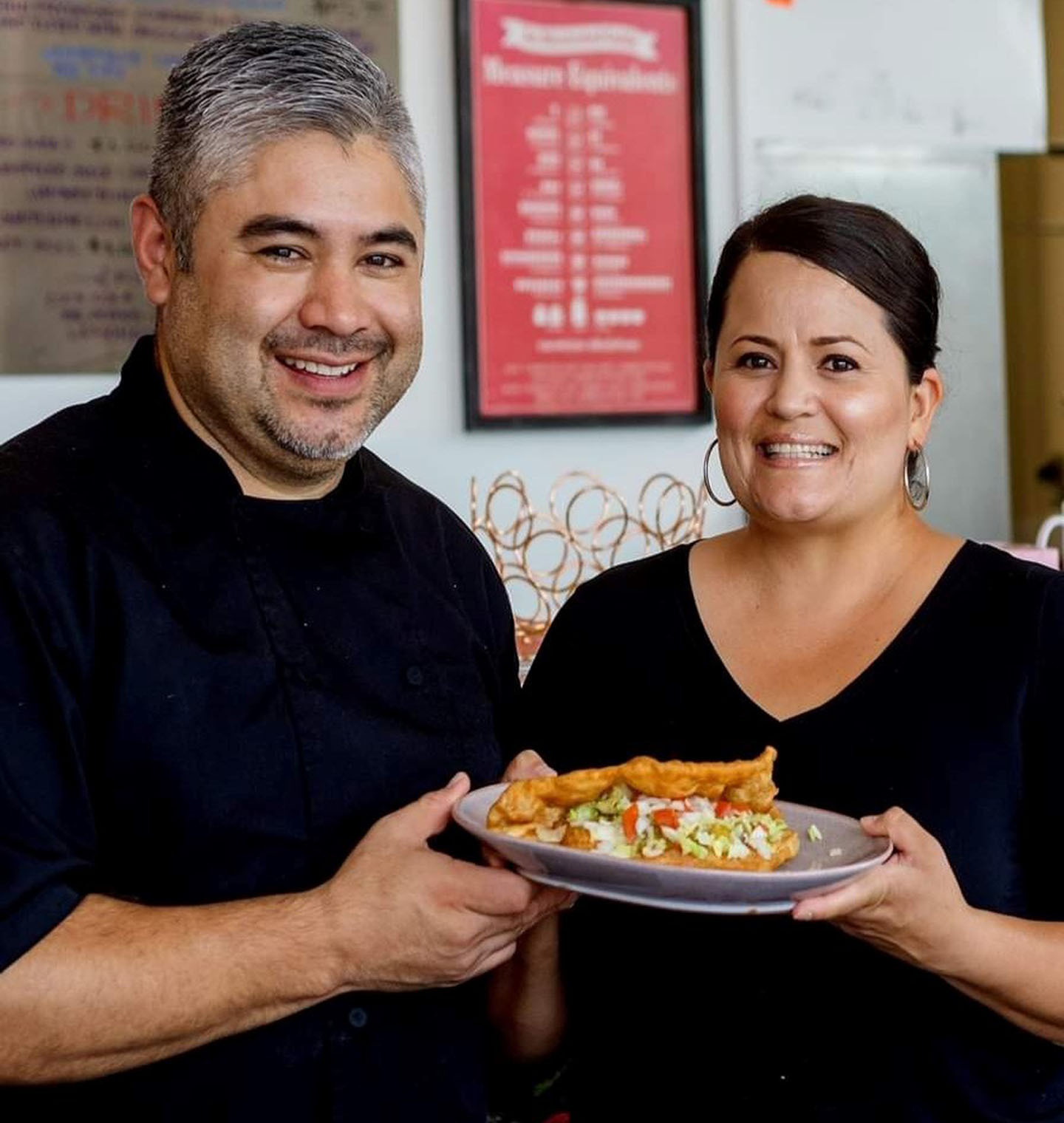
As needs intensify globally and families are faced with increased uncertainty, our Foundation is investing to provide underserved populations with the support they need to manage through these unpredictable times and build capability for a more stable future. In each market, our approach is customized to meet local needs.
Throughout history, Black and Hispanic Americans have been denied access to equitable education, capital and economic opportunity compared to their white counterparts. The effects of these barriers have been exacerbated by the COVID-19 pandemic, causing community college enrollment to decrease by 19% among Black students and 16% among Hispanic students; 41% of Black-owned businesses have shuttered since February 2020, and 86% of Hispanic small business owners have reported significant negative impacts, including complete closing.
Further, marginalized communities across the globe are also battling daily inequities — especially those that affect women. Female farmers are often unpaid and undervalued, despite being essential to feeding the world. Research shows that if female farmers had the same resources as male farmers, they could increase yields on their farms by 20% to 30%, potentially reducing the number of hungry people in the world by as many as 150 million.
The PepsiCo Foundation is committed to investments in education programs, training, and mentoring and supporting small business owners from communities around the world to help establish equitable solutions to closing the income gap, alleviating historical barriers and providing sustainable pandemic relief.
We believe in the often overlooked power of underserved communities around the world and will continue to work to create a more equitable world. As part of PepsiCo’s more than $570 million Racial Equality Journey, we are committed to uplifting Black and Hispanic people, businesses and communities in the U.S. to address issues of inequality and create opportunity. Further, we are committed to addressing inequity and creating economic opportunity for marginalized communities around the globe.
By 2025, our goal is to provide scholarships to 4,000 Black and Hispanic students and help 1,000 Black- and Hispanic-owned restaurants and small food businesses grow. Further, we are committed to supporting 5 million female farmers and their families around the world.
National Urban League: The PepsiCo Foundation and the National Urban League have partnered to create the Black Restaurant Accelerator. This $10 million initiative will provide 500 Black restaurant owners in 12 cities over the next five years with capital and business coaching. The program provides critical support to Black restaurateurs who were disproportionately impacted by the pandemic.
CARE: We’re the largest private-sector partner in CARE’s She Feeds the World program, which addresses gender inequality in farming in Peru, Egypt, Uganda and other countries. Our $18.2 million investment aims to provide approximately 5 million female farmers and their families with education, resources and economic support that can help them increase crop yields and income. In Uganda, we’ve reached nearly 200,000 people with training that covers gender-inclusive leadership, sustainable farming and sanitary food preparation.
Robin Hood Foundation: Through partnership with New York City’s largest poverty-fighting organization, we’ve given $4 million to help women and girls in New York City on the path to high-quality education and good jobs. Our partnership supports local organizations that teach coding, computer science, construction skills and culinary arts, such as Computer Science for All, Lehman College and Nontraditional Employment for Women (NEW).
Community Colleges: To support Black and Hispanic students with access to higher education, PepsiCo and The PepsiCo Foundation have partnered with 20 U.S. community colleges on a $40 million community college and professional mentoring program. This provides financial aid and is designed as a wraparound system to address critical gaps and provide access to services that alleviate barriers students face outside of school.
Community Development Financial Institutions: The PepsiCo Foundation works with Community Development Financial Institution (CDFI) partners, including Allies for Community Business, Ascendus, LiftFund, Accion Opportunity Fund, DreamSpring and other local organizations on the IMPACTO Hispanic Business Accelerator. The $10 million in funding it will provide is for 500 Hispanic small food and beverage business owners, in cities across the U.S. where Hispanic-owned small businesses were hit particularly hard by the COVID-19 pandemic, to help grow their enterprises over the next five years.
International Youth Foundation: We’ve invested $2.5 million in the International Youth Foundation’s Passport to Success® Traveler program, an online training course designed to teach life and digital skills to help young women succeed in the workplace. The free curriculum is available online in multiple languages.
JA Worldwide: Working in more than 100 countries, JA equips young people with the employment and entrepreneurship skillsets and mindsets they need to succeed. By building abilities and nurturing belief in themselves, JA prepares youth for the future of work, ensures they have the tools to be financially capable adults, and teaches them to think entrepreneurially to build a brighter future for the next generation of global innovators, entrepreneurs, makers and managers.
We’re committed to supporting causes our associates care about through engagement programs. In times of great need for our associates or our communities, the PepsiCo Foundation steps up. And in turn, our associates give back by giving their time, talent and financial support to organizations making a positive local impact.
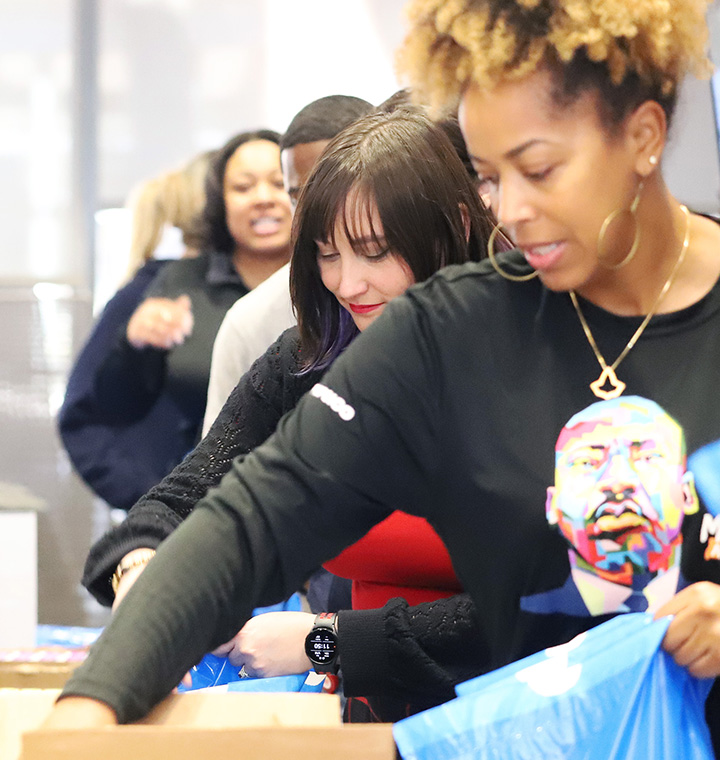
The PepsiCo Foundation has a long history of supporting the communities where our associates live and work. Whether it’s through financial assistance, grants, scholarships, or volunteer events — when others are in need, we do what we can.
Volunteering is another way for all our associates to feel more engaged, proud and connected to their local team and community. Programs including charitable giving matches and One Smile At a Time give employees opportunities to make a difference.
U.N. World Food Programme, World Central Kitchen, Save the Children and American Red Cross: In 2023, the PepsiCo Foundation committed $1.5 million USD in humanitarian aid to support Türkiye and Syria earthquake relief efforts.
We are a team of changemakers, propelled by local partners, informed by decades of experience, and driven by the passion to do more. Watch stories about how PepsiCo is partnering with communities to address food insecurity and the global water crisis in our video series, Changemakers.